What you eat is an essential part of preparing for pregnancy, check out our Thrive Journey guide for all you need to know
Making sure your diet is packed full of nutrients with the right balance of foods, and fertility vitamins like folic acid and vitamin D is super important when you are planning to have a baby.
The food choices you make can balance hormones, even improve the quality of your eggs and support healthy ovulation. And it’s just as important for the men too – as sperm quality also depends on a balanced and healthy diet.
And just as healthy fats, minerals and vitamins can help support healthy conception, bad dietary choices such as too much sugar, irregular eating and a diet high in saturated fats is more likely to result to have a negative impact on fertility.
So, dive in and check out our best nutrition tips for boosting fertility.
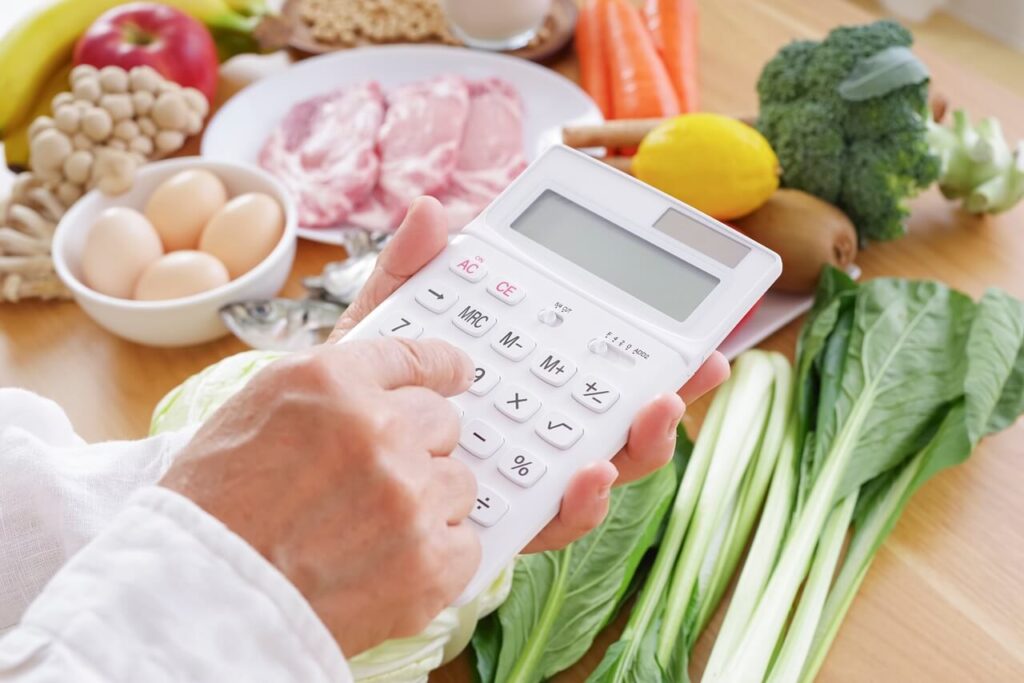
The 6 key nutrients for fertility (and which foods provide them)
#1: Folate/Folic Acid
Folate is a B vitamin and folic acid is a supplement which is usually taken as a powder or tablet. Folate is essential for both women and men trying to conceive. For women it helps protect against neural tube defects in early pregnancy and assists in the healthy development of eggs and cell division. And for men it promotes healthy sperm.
This is one fertility supplement which is usually recommended as it is difficult to get enough folate from your diet. Take at least 400 mcg folic acid daily (1) – ideally for a month before you plan to conceive and for three months following conception. Folate rich foods include leafy greens, legumes and fortified grains and fruits such as avocado, strawberries and oranges.
#2: Vitamin D
Many of us are deficient in Vitamin D – the best source is from sunshine, as our body produces it naturally with safe sun exposure. Vitamin D helps to harmonise hormone levels, assists with egg implantation and supports healthy egg development. It also helps promote healthy sperm and maintain testosterone levels for men.
Foods which are rich in Vitamin D include oily fish (such as sardines and salmon), egg yolks, fortified dairy – some yoghurts and milk have Vitamin D added. You may wish to consider a supplement but check this first with your doctor or dietician.
#3: Antioxidants
Think of these as the soldiers that help to protect your body (and eggs and sperm) from oxidative stress (also known as free radicals which can destabilise the body). Antioxidants are found in foods such as fruits (especially berries, apples, grapes and oranges), vegies (leafy green vegetables, broccoli, spinach and kale) nuts, kidney beans and wait for it – dark chocolate!
Antioxidants are crucial for proper female reproductive function. A 2023 study in Slovakia (2) found antioxidants can counteract the damaging effects of oxidation on female reproduction and supplementing with antioxidants during the treatment of infertility might improve the outcome.
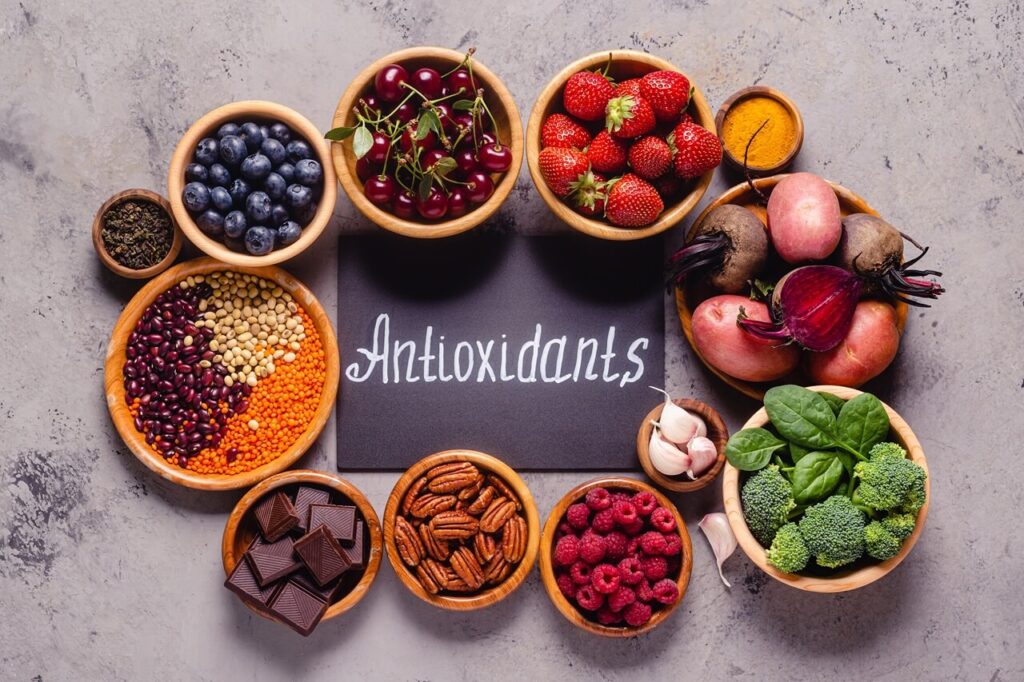
#4 Iron
Without adequate iron we can become anaemic and iron deficiency can also impair ovulation, so it’s important that your iron levels are checked and you eat iron-rich foods such as lean red meat, poultry, fish such as salmon, sardines and tuna, spinach, legumes and nuts and seeds.
#5: Omega-3 Fatty Acids
Foods such as salmon, sardines and mackerel as well as plant-based sources including flaxseeds and chia seeds are fertility superfoods. Omega 3 fatty acids help to reduce inflammation and balance hormones for both men and women. A study published in 2022, (3) focused on women between the ages of 30 -44 who had been trying to conceive for less than three months and had no history of infertility, found omega-3 supplementation may increase the probability of a woman conceiving.
#6: Protein and Carb Balance
Lastly, make sure that you opt for lean proteins (protein with minimal fat and ideally no saturated fat, cholesterol and saturated fat) so choose foods such as eggs, fish, low-fat dairy such as Greek yoghurt and chicken and turkey breast without the skin.
And swap out refined carbohydrates (4) such as white bread and rice for “low glycaemic” complex carbs (wholegrains) such as brown rice, oats and legumes. This can also support fertility – especially if you have PCOS. A 2007 US study involving a group of apparently healthy women found that greater carbohydrate intake was associated with an increased risk of infertility due to anovulation, where the ovaries do not release an egg during the menstrual cycle.
Five Healthy Eating Habits
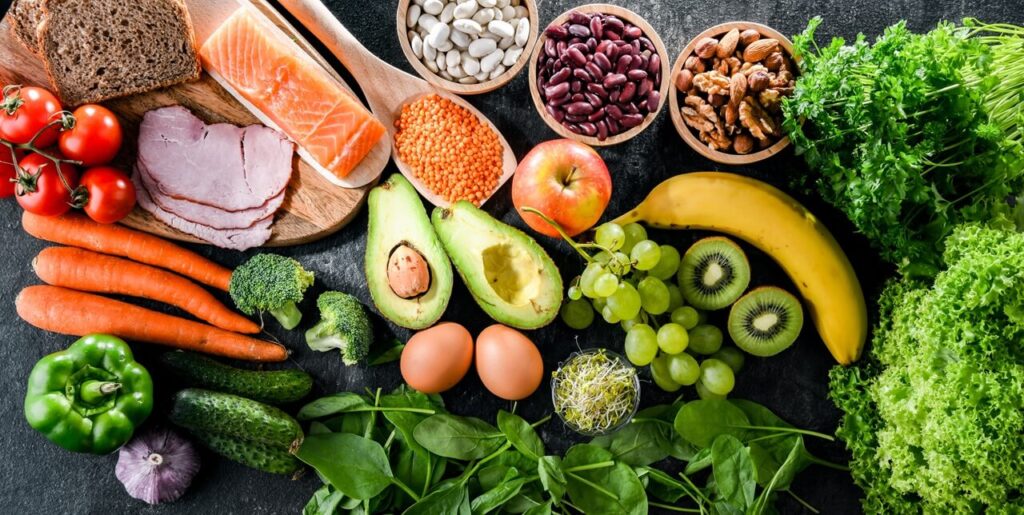
#1: Reach for the rainbow
Eat a range of brightly coloured fruit and vegies daily to boost health and fertility. Go for purples: (beetroot and blueberries) to help protect the body’s cells, red (strawberries and tomatoes) for lypcopene for a healthy heart, orange and yellow (pumpkin, carrots) for betacarotene which is converted to Vitamin A, green (broccoli and spinach) for that all-important folate, and brown and white (bananas and potatoes) for potassium – essential for healthy egg development (5).
#2: Eat a hearty savoury breakfast
Especially good for women with PCOS as it helps with hormonal balance and it can also assist insulin regulation. You’ll keep blood sugar levels stable and prevent energy levels from dipping.
#3: Maintain a healthy weight
Being under or overweight can have a detrimental effect on ovulation and sperm count. Check your weight is within the healthy range – and you can also google a BMI calculator to check your weight for your age and height.
#4: Eat in moderation
Eat regularly to keep blood sugar levels stable and avoid fad diets. A Mediterranean-style diet (packed with fish, olive oil and veggies) is touted as a fertility friendly diet – for more on this and other great fertility diet tips check out our Thrive 8 pillar guide to nutrition.
#5: Quit bad habits
Avoid alcohol, sodas, reduce caffeinated drinks and trans fats (commercially baked goods such as biscuits and cakes), sodas, excessive sugar and snacking late at night!
Hydration and gut health
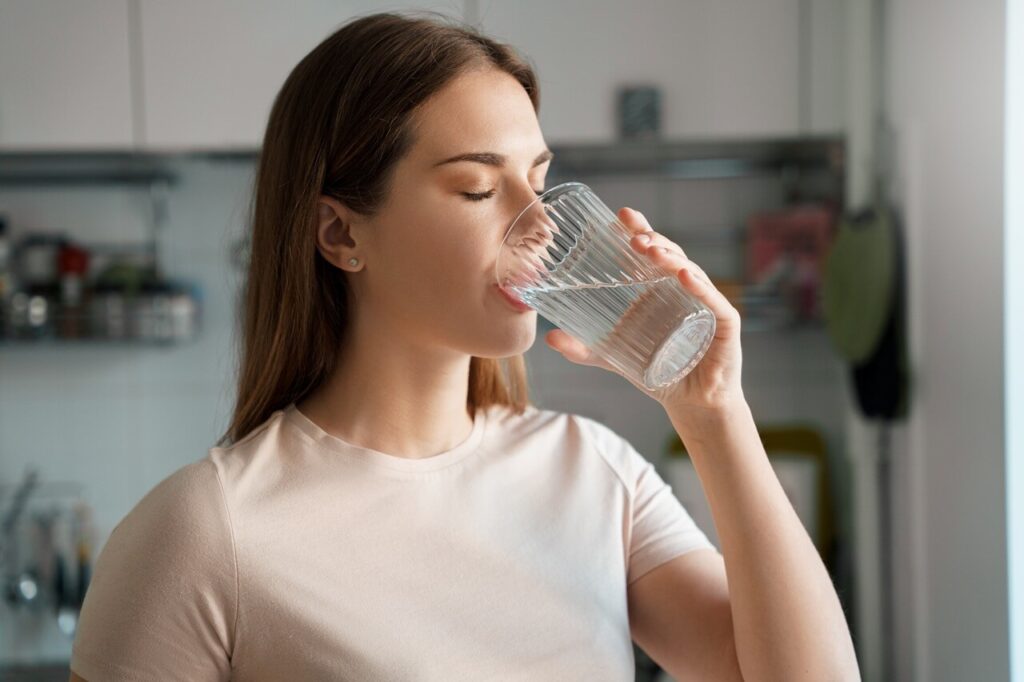
Staying hydrated helps to maintain healthy cervical mucus, supports hormonal balance and aids healthy blood flow to the reproductive organs.
Aim to drink around 8 glasses of water a day (about two litres), but as our Thrive Journey fertility expert, Marie Otsuka explains, you can also get your fluid from many fruits and vegetables, for example, watermelon and spinach are almost 100 per cent water by weight. She adds: “Water has no calories, so replacing sugary drinks with plain water can help reduce caloric intake.”
And our Thrive Journey yoga and Qi Gong teacher, Sarah Manning advises avoiding icy drinks as in Traditional Chinese Medicine cold creates imbalance in the digestive system and can damage our kidney energy. So, ditch those ice cubes and icy cold drinks!
Have your water at room temperature or even sip warm water, you may also like to add in grated fresh ginger for flavour and as a digestive aid.
Marie adds: “Water makes up about 50% to 70% of your body weight. And your body depends on water to survive. Water also helps your body maintain a normal temperature, lubricates and cushions joints, protects your spinal cord and helps the body remove waste via urination, perspiration and bowel movements.
Pre and Probiotics
These are also important for fertility, as they help to reduce inflammation, aid gut health and can help to balance hormones – the best way to have probiotics in your diet is through fermented foods such as sourdough, kefir, sauerkraut and kimchi. High fibre foods also help gut health – go for wholegrains (oats, brown rice), fruits (berries, apples), legumes and vegetables.
Vitamins and Supplements for Fertility
In terms of vitamins to get pregnant, fertility vitamins like folic acid and vitamin D are believed to be the most important.
Other fertility supplements and vitamins you might be considering include the following:
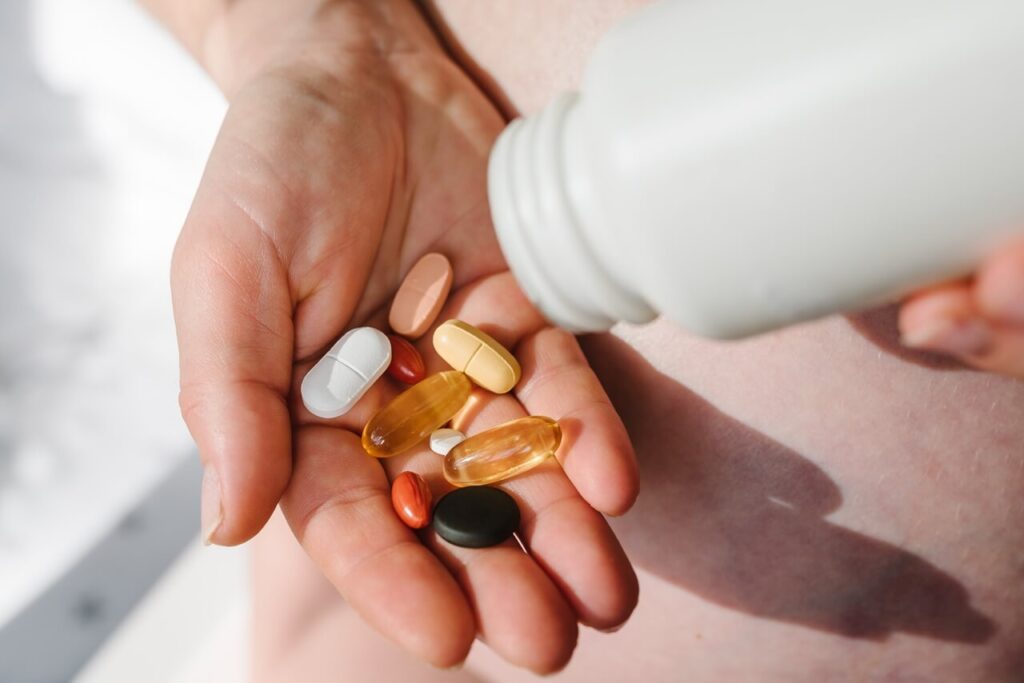
Fertility Supplements – know your fertility vitamin A, B, Cs…
Prenatal Vitamin or Multivitamin: A good quality prenatal vitamin covers most of the main vitamins (such as folic acid, iron, iodine and complex B vitamins). Check the ingredients and as with all supplements, check with your doctor or dietician first.
Folic Acid: As mentioned, earlier this one is non-negotiable as it helps to regulate hormones which is essential for ovulation and egg implantation.
Vitamin D: it’s worth getting your Vitamin D levels checked as most of us are deficient and it’s difficult to get Vitamin D through your diet. It helps with hormone balance, aids embryo implantation and can improve sperm quality. See your GP for a blood test to check your levels.
Coenzyme Q10 (CoQ10): This antioxidant is gaining popularity, especially for more mature mums-to- be as studies have indicated it could have better quality embryos and even higher pregnancy rates. The study (6) is limited as it only involved 60 women but many fertility professionals are recommending it to women. Food sources of CoQ10 are found in grass-fed beef, free-range chicken, sesame seeds and pistachio nuts, considering it is difficult to get enough through food, many people do choose to take a supplement instead.
Inositol (myo-inositol): this is a naturally occurring compound which is produced by the body and has an important part in cell membranes, regulating calcium flow and hormone health. It can also be found in wholegrains, citrus fruits, legumes and veggies such as cabbage, tomatoes and asparagus. It is believed to be helpful for women with PCOS as it can improve sensitivity and promote ovulation.
Omega-3 (Fish Oil): As mentioned above, this is great for sperm quality and uterine health, but most sources are from fish, so if you don’t eat seafood, you may wish to consider a supplement.
Vitamin B1, B6 and B12: These vitamins are usually in a general pre-natal vitamin supplement, but if not, you may wish to consider them. B1 (known as thiamine) and our bodies use this to covert carbohydrates to glucose and metabolise our food for energy. For fertility a 2017 Japanese study (7) indicated that being deficient in B1 could result in low quality oocytes, which can in turn reduce fertility. B6 also helps to support hormone balance and helps support the production of the hormone progesterone in the second half of the cycle.
B12: aids ovulation and egg health, it also works with folate to help prevent neural tube defects and aid early foetal development.
Vitamin E and C: These are both antioxidants and Vitamin E is sometimes referred to as the fertility vitamin as it supports ovarian health, balances hormones and protects egg and sperm quality. Vitamin C protects the cells and is supports sperm health.
Zinc and Selenium: These trace minerals can often be found in general pre-natal vitamins. They have a key role in reproductive hormone production and are important for healthy sperm. In your diet, the best sources are oysters for zinc and brazil nuts for selenium.
Herbal and Alternative Supplements
Herbs such as Maca root, Vitex (Chasteberry) and Ashwagandha are often mentioned in relation to fertility, but as Sarah Manning says, it is imperative to have professional advice before taking herbs.
She says: “Discuss herbs and alternative fertility supplements with a professional naturopath, Traditional Chinese Medicine or Ayurvedic practitioner. It is important to seek a clear diagnosis from a professional practitioner before taking any herbs.”
For more information on fertility herbal supplements, check out Professor Christopher Chen’s book: Your Infertility is My Problem. Here:
NB: There will be an internal link to Prof Chen’s book – hopefully like by next week.
Professor Chen is the founder and chairman of the Advanced Centre for Reproductive Medicine (Singapore) and the Director of IVF (SG).

Adding Ayurveda to your health routine
Ayurveda is a beautiful, elegant, simple and ancient “science of life”.
Sarah explains: “It is the holistic art of studying your physical body (how it sleeps, eats, digests, poos, sweats, exercises, menstruates, solves immune challenges, moves heat in the body, circulates blood and lymph) as well as your emotions, response to emotional stimulus, “embodied but forgotten trauma”, your energy, your life force and how it manifests.”
We all have a dominant dosha and knowledge of this and aiming to avoid imbalance, we can use food to help balance our doshas. Find out more about this in our Thrive Journey program: Fertility for your Dosha.
Fertility superfoods
It can seem a bit overwhelming to cover all these essential vitamins and nutrients in your daily diet, so here are five fertility superfoods which are all packed with key vital nutrients to help power up your pre-pregnancy plate!
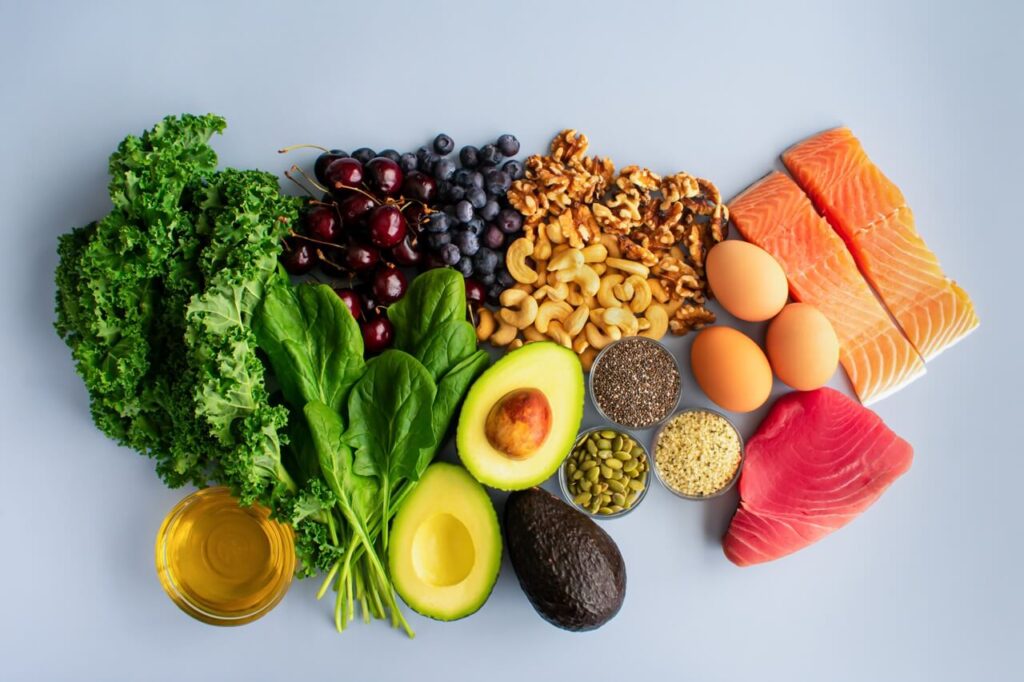
#1: Avocado – surprisingly this is classed as a fruit and is a superpower when it comes to nutrition. It’s a great source of potassium, folate, vitamin E and rich in healthy fats and antioxidants. It helps in the absorption of key vitamins and supports egg quality, hormone balance and uterine health.
#2: Eggs – there are so many ways you can add eggs to your diet, simply eating them hard boiled as a snack adding a poached egg to noodles or eating an omelette for lunch, you can get iron, choline (which supports hormones regulation, egg quality and research (8) has suggested it may even help foetal brain development *) plus eggs are packed with B vitamins, protein, and omega-3 fatty acids.
3: Berries – packed with antioxidants, berries help to promote circulation and protect eggs and sperm from oxidative stress and strawberries also contain Coenzyme Q10.
4: Fish – especially salmon, sardines and mackerel. Add fish to your shopping list for omega 3 fatty acids for inflammation reduction and for helping boost egg and sperm quality.
5: Nuts and Seeds – snack regularly on a handful of nuts and sees as they are loaded with a range of nutrients from omega 3 to vitamin E and zinc. Nuts such as walnuts, brazil nuts, sunflower seeds and pumpkin seeds are particularly good.
A final word…
Remember that consistency is the key – don’t worry if you don’t always have the “perfect diet” – there’s no such thing! Make little changes and you will quickly begin to improve your wellbeing, energy and fertility.
And for delicious meal ideas, check out Mani’s Ayurvedic Recipes, which are tailored for hormonal balance and fertility.
References:
(1) https://www.nhs.uk/medicines/folic-acid/pregnancy-breastfeeding-and-fertility-while-taking-folic-acid/
(2) Vašková J, Klepcová Z, Špaková I, Urdzík P, Štofilová J, Bertková I, Kľoc M, Rabajdová M. The Importance of Natural Antioxidants in Female Reproduction. Antioxidants (Basel). 2023 Apr 11;12(4):907. doi: 10.3390/antiox12040907. PMID: 37107282; PMCID: PMC10135990. https://pmc.ncbi.nlm.nih.gov/articles/PMC10135990/#sec4-antioxidants-12-00907
(3) J Stanhiser, A M Z Jukic, D R McConnaughey, A Z Steiner, Omega-3 fatty acid supplementation and fecundability, Human Reproduction, Volume 37, Issue 5, May 2022, Pages 1037–1046, https://doi.org/10.1093/humrep/deac027
(4) Chavarro JE, Rich-Edwards JW, Rosner BA, Willett WC. A prospective study of dietary carbohydrate quantity and quality in relation to risk of ovulatory infertility. Eur J Clin Nutr. 2009 Jan;63(1):78-86. doi: 10.1038/sj.ejcn.1602904. Epub 2007 Sep 19. PMID: 17882137; PMCID: PMC3066074. https://pmc.ncbi.nlm.nih.gov/articles/PMC3066074/#S9
(5) For more on this check out Nutrition Australia: https://nutritionaustralia.org/resources/eat-a-rainbow/
(6) A 2020 article in the Journal of Assisted Reproduction and Genetics found that oral supplements of Coenzyme Q10 can increase the chances of pregnancy.
, P. et al. Does coenzyme Q10 supplementation improve fertility outcomes in women undergoing assisted reproductive technology procedures? A systematic review and meta-analysis of randomized-controlled trials. J Assist Reprod Genet 37, 2377–2387 (2020). https://doi.org/10.1007/s10815-020-01906-3
(7) Tsuji A, Nakamura T, Shibata K. Effects of Mild and Severe Vitamin B1 Deficiencies on the Meiotic Maturation of Mice Oocytes. Nutr Metab Insights. 2017 Mar 15;10:1178638817693824. doi: 10.1177/1178638817693824. PMID: 28469464; PMCID: PMC5395269. https://pmc.ncbi.nlm.nih.gov/articles/PMC5395269/
(8) Spoelstra, S. K., Eijsink, J. J. H., Hoenders, H. J. R., & Knegtering, H. (2023). Maternal choline supplementation during pregnancy to promote mental health in offspring. Early intervention in psychiatry, 17(7), 643–651. https://doi.org/10.1111/eip.13426
